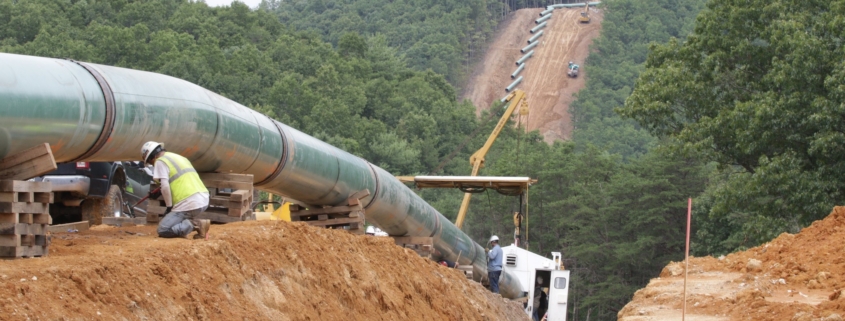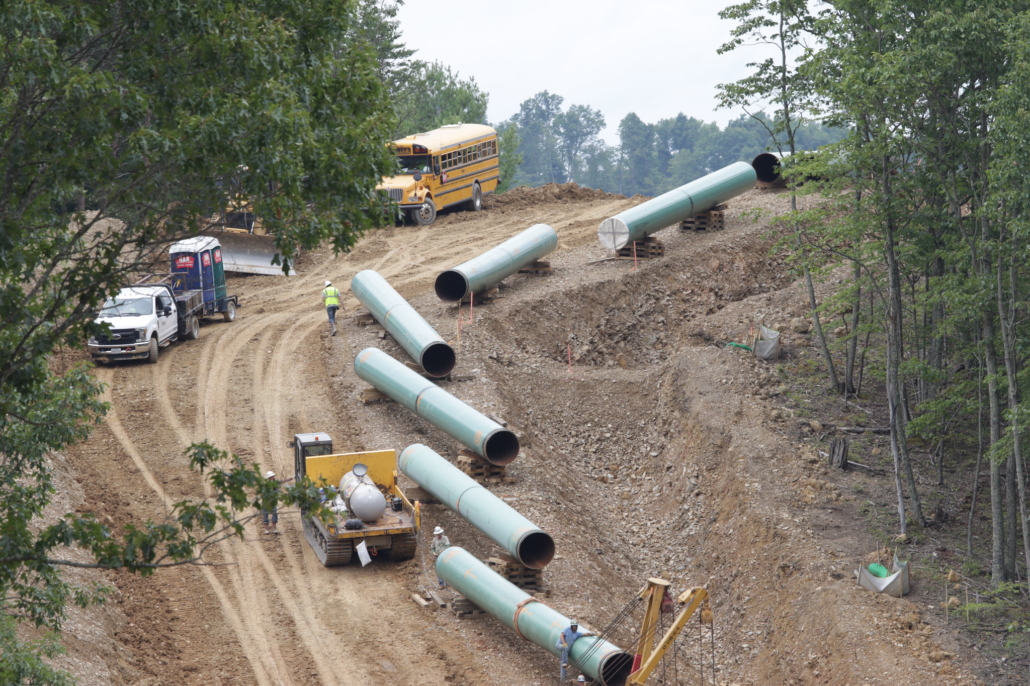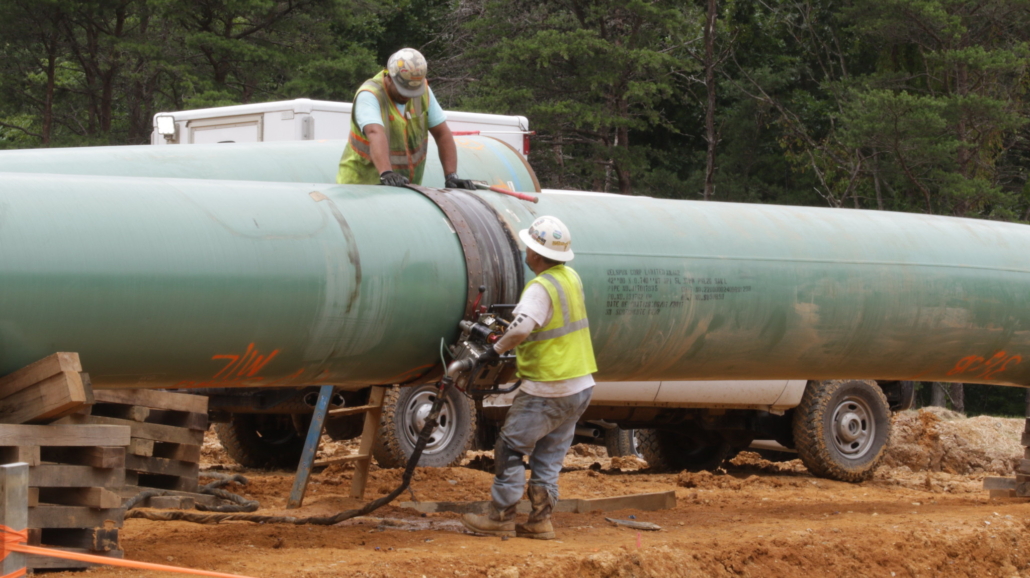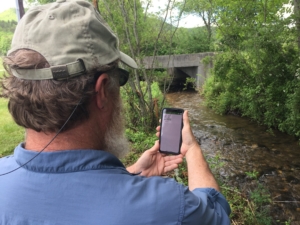What’s Next for the Mountain Valley Pipeline?
Photo by Jenny Harnish
In late June, the WVDEP closed the public comment period for the Mountain Valley Pipeline’s Clean Water Act Section 401 Water Quality Certification. This permit would allow to dig a trench through 175 streams in WV.
Now, the WVDEP is faced with an important decision that has dire implications for our steep mountainsides, water quality, and flora and fauna that call these places home.
While we wait for WVDEP’s decision on the permit, we thought we’d take a moment and breakdown what happened during the 401 comment period, as well as and ponder some potential next steps.
Can the Mountain Valley Pipeline Meet Water Quality Standards?
In preparation for the comment period, (the second round of MVP 401 comments for those of you keeping score at home) staff scientist, Autumn Crowe, combed through the 401 permit application, identifying multiple aspects of the permit that would lead to water quality violations. Her verdict – there is no way the project can meet the state’s water quality standards.
Additionally, when Autumn reviewed the Mountain Valley Pipelines past violation history with the WVDEP – 50 violations to water resources totaling over $500,000 – she determined that the pipeline would put streams and wetlands at risk for catastrophic pollution events – especially since this permit allows construction activities in and through waterbodies. Autumn compiled her analysis of MVP’s past violations in this interactive map.
Mountain Valley Pipeline, and its backers, main argument for approving the project is centered around economic development. Perpetuating the false narrative of choosing between good jobs and a healthy ecosystem. That is not a decision anyone should have to make and at WV Rivers, we believe it is possible to do both, create jobs and preserve clean water.
We know MVP’s erosion control measures aren’t going to keep the sediment out of the water. We know that they’ll fail to maintain them. It costs more for MVP to maintain their erosion controls than it does for them to pay a fine for a violation.
Photo by Jenny Harnish
A “Re-occurring Nightmare”
That brings us to WVDEP’s public hearing on the Mountain Valley Pipeline’s 401 water quality certification. On June 22, sixty-five people attended the virtual hearing, seventeen spoke against the project and seven in support. Autumn provided comments on behalf of WV Rivers, summing up the collecting frustration so many have felt about the pipeline by saying,
I’ve been following the Mountain Valley Pipeline saga since it was first proposed in 2014 and it’s been like a re-occurring nightmare that we can’t wake up from.
Highlighting the Mountain Valley Pipeline’s disregard of adequate environmental protections and WVDEP’s regulatory negligence, Autumn shares,
In 2016, we commented on this same permit and warned DEP that MVPs proposed erosion controls would be ineffective on our steep slopes and our rivers and streams would be damaged as a result of construction. Now five years later, I feel like a broken record and I hate to have to say we told you so.
You can read Autumn’s full public hearing comments, as well as the technical comments we submitted prior to the hearing. Backing our technical comments are fourteen organizational partners and over 450 individuals who took action through our online advocacy tool.
Photo by Jenny Harnish
So, What’s Next for the Mountain Valley Pipeline?
There are several more hurdles (and permits) to clear before the company can resume construction.
The Federal Energy Regulatory Commission (FERC) must sign off on MVP’s certificate amendment request to bore under 180 streams and wetlands. FERC has given an estimated date of August for an environmental assessment of the boring impacts. Read our technical comments on the request.
The Mountain Valley Pipeline must also gain approval from the Army Corps of Engineers through a Clean Water Act Section 404 permit for temporary and permanent impacts to 7.5 miles of streams and over 14 acres of wetlands. Read our technical comments on the 404 permit.
In Virginia, the Mountain Valley Pipeline must also go through the same permitting process to receive their 401 Water Quality Certification. Virginia has requested additional time from the Army Corps for their 401 review and the Army Corps gave them until Dec 31, 2021.
In West Virginia, the WVDEP will need to review and respond to all comments received on the 401 Water Quality Certification when they issue their final decision, which will come before the end of November 2021. You can be assured that WV Rivers will be ready to analyze their response to ensure that it complies with the provisions of the Clean Water Act.
In the meantime, no trenching through streams can happen until MVP secures both the 404 and 401 permits from the Army Corps and the states. We will notify you if and when this occurs.
What You Can Do
If these permits are approved, we will need boots on the ground monitoring construction activities to ensure that our streams are not being damaged. Volunteers can monitor construction and report water quality impacts by taking our stream crossing training, and using our stream watch app to identify and document pollution events.
If you’re not able to monitor streams in the path of MVP, there are other important ways you can help. Make a donation to support technical analysis on permit decisions, assist volunteers with documenting pollution events, and elevate Mountain Valley Pipeline’s transgressions in the media.
If you haven’t already, please share resources like this blog with your friends and family! We have a series of short videos on the Mountain Valley Pipeline’s impacts, educational webinars, and scientific reports designed for the public on pipeline impacts. You can find all of our videos here; our interactive story maps on pipelines here, here, and here; and our publications here.







